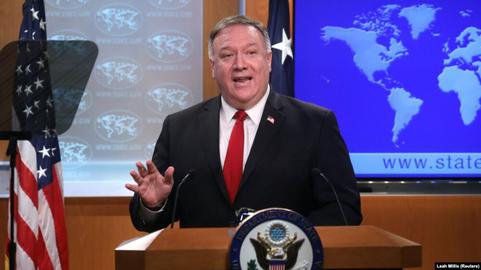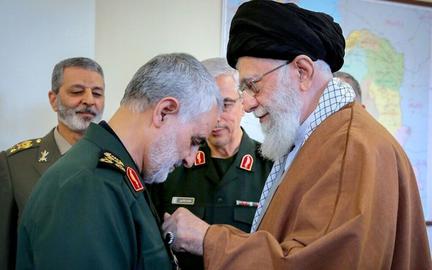The United Nations arms embargo on Iran formally came to an end on Sunday, October 18, 2020. "From Sunday,” President Hassan Rouhani said on the Wednesday, “we can buy weapons from anyone we want and sell weapons to anyone we want.”
The US was quick to respond, with Secretary of State Mike Pompeo threatening to sanction any party seeking to make deals with Iran after this clause of the 2015 Joint Comprehensive Plan of Action (JCPOA) took effect. In return, Iran’s defence minister said Iran would only sell weapons to countries that “won’t misuse them”, adding caustically: “Unlike the Americans, we wouldn’t do just about everything for money,”
How much of this exchange was more than hot air? Was the UN’s honoring of the 2015 agreement symbolic, or will it have a practical effect? What change can the end of the arms embargo actually bring to the Islamic Republic of Iran?
***
Back in 2015, after the Joint Comprehensive Plan of Action (JCPOA) and UN Resolution 2231 had been ratified, the number of Iranian military officials visiting Russia increased exponentially. It had been explicitly agreed that the UN arms embargo on the Islamic Republic would end in five years’ time, and there was no time to lose. Shortly after the agreements were signed, Hossein Dehghan, a former brigadier general in the Islamic Revolutionary Guards Corps air force and then minister of defense in President Hassan Rouhani’s first government, went to Moscow to present a long list of weapons needed by the Islamic Republic to Russian officials.
The IRGC-affiliated Tasnim news agency reported the items needed as anti-submarine missiles, amphibious ships, Sukhoi-35 fighter jets, and T-90 battle tanks. Although the sale of these items to Iran was, even then, theoretically possible or at least permissible with the permission of the UN Security Council, none of this equipment was sold to Iran at the time. But since 2015, Iranian military officials have stayed in close contact with Russia, and patiently awaited the end of the arms embargo.
Half a decade on, the day has come. On paper at least, there is no longer a UN ban on buying and selling conventional weapons and armaments from or to the Islamic Republic of Iran. This gesture in deference to the principles of the JCPOA, though, is but a small relief compared to the obstacles Iran may yet have to overcome.
Fallout at the Top Table
At the UN Security Council meeting, the United States predictably sought to extend the arms embargo. Meanwhile, China and Russia, two permanent members of the Security Council, strongly opposed the US’s petitions. Both of these countries saw the discussion as an opportunity to show they adhere to international rules – and of course, to curry favor with the Islamic Republic.
But Russia’s stated opposition to the extension of the embargo should not be read as a Moscovite rush to sell arms to Tehran. Even if Russia is really willing to sell military equipment to Iran, there are more serious financial, technical and political roadblocks on the way.
On September 21, before the UN arms embargo expired, US President Donald Trump signed an executive order imposing fresh sanctions on individuals and entities supporting Iran’s arms-related and nuclear capabilities. It was accompanied by a statement that asserted: “My actions today send a clear message to the Iranian regime and those in the international community who refuse to stand up to Iran.
“The United States will not allow the Iranian regime to further advance capabilities to directly threaten and terrorize the rest of the world. My Administration will use every tool at our disposal to stop Iran’s nuclear, ballistic missile, and conventional weapons pursuits.”
Although the US sanctions do not pose a threat to Russian state-owned arms companies, they could well affect the private and commercial lives of individuals with links to the US who seek to do business with Iran, who could see their assets and bank accounts frozen or even be prosecuted. The continuing US sanctions against financial transactions with the Islamic Republic also hamper people’s ability to conduct regular business with the country.
On Sunday, Secretary of State Mike Pompeo appeared to extend this, warning that the United States would hit any individual or entity that assists Iran’s weapons program with sanctions. “Any country that now challenges this prohibition will be very clearly choosing to fuel conflict and tension over promoting peace and security,” he said.
Iranian officials were undeterred, with foreign minister Javad Zarif taking to Twitter to celebrate a symbolic victory – using the same terminology. “Today’s normalization of Iran’s defense cooperation with the world is a win for the cause of multilateralism and peace and security in our region,” he wrote.
Will Russia Sell Anti-Aircraft Missile Systems to Iran?
Russia had been reticent about the prospect of selling weapons to Iran even before the UN Security Council imposed its arms embargo 13 years ago. While for the past five years, arms sales to Iran have been possible in principle with the permission of the Security Council, Russia rebuffed another request from the Islamic Republic to buy Sukhoi-35 fighter jets two years ago.
More recently, though, its ambassador to Tehran said talks were ongoing about Russia selling its S-400 anti-aircraft missile system to Iran. The S-400 is not classified as an offensive equipment but as a defense system that could bolster Iran’s ability to counter a foreign attack. But ambassador Laurent Jagarian also made it clear the sale was contingent on Iran’s ability to pay, and explicitly ruled out the possibility of such equipment being provided to Iran on credit.
The Islamic Republic's available capital has plummeted since US sanctions took effect from 2018. Some of its assets have also been frozen in Japan, South Korea and even Iraq. The value of the toman has shrunk tenfold in half a decade and the country is in the grip of an unprecedented economic crisis. Credit arms sales are commonplace around the world, but Russia’s unwillingness to lend to Iran is, in the circumstances, not surprising.
In addition, the sale of weapons to the Islamic Republic would – in the present climate – constitute a clear shot above the bows from Russia to countries such as Israel, the United Arab Emirates and Saudi Arabia. Since Russia stopped cooperating with Iran in the Syria conflict, Israel has intensified its military attacks on Iran-linked military bases in the country. Providing the S-400 system to Iran would be a statement by Russia on its role as self-appointed arbiter in the region.
An Empty Gesture – For Now
At a time when Iran’s government says it cannot even purchase the required medical equipment and medical supplies for its citizens, a spending spree on weaponry seems unlikely. It would also only worsen the crisis of trust between the Iranian state and the people it serves – that is, unless such transactions take place in secret, which again would be out of turn for a government that relies on propaganda.
President Rouhani’s assertion that Iran can sell weapons to “anyone we want” in the aftermath also rings hollow. While in principle Iran can now sell conventional arms, including small arms, missiles, helicopters and tanks, to outsiders, it is not clear why – given that much of Iran’s own military hardware is now out of date, and particularly in light of ongoing US sanctions – any legitimate actor would want to buy weapons from Iran rather than any other supplier in the world.
In conclusion, the UN’s lifting of the arms embargo on Sunday, October 18, 2020 was largely a symbolic gesture of its adherence to the spirit of the JCPOA. It is unlikely to have much of a real-world impact on the purchase or sale of weapons by the Islamic Republic.
visit the accountability section
In this section of Iran Wire, you can contact the officials and launch your campaign for various problems




























comments